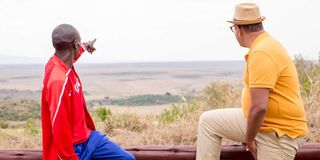Kenya seeks Kipchoge’s speed to revive tourism

Olympic marathon champion and world record holder Eliud Kipchoge (left) and Tourism Cabinet Secretary Najib Balala view game at the Maasai Mara Game Reserve on August 8, 2020.
What you need to know:
- The signing of Olympic marathon champion Eliud Kipchoge, who is a world marathon record holder (two hours, one minute and 39 seconds) as Kenya’s tourism ambassador for six months, took sports tourism to another level
- Balala singled out athletics, motor rallying, golf, volleyball and rugby as their top priority in the government’s huge plans for sports tourism
- Balala said that his ministry will consult with the sports ministry and treasury to see how much the sports tourism venture will cost
- Balala acknowledged that the tourism sector had been hit hard, almost nearing a shut-down but noted that the re-opening of the country on July 15 has seen a slow return to life at the national parks, game reserves among other attractions
The rules of the jungle are very clear: The lion will have to run faster than the gazelle to be able to find food, or else it starves to death.
Likewise, the gazelle must run faster than the slowest lion for its survival, lest it be the king of the jungles’ breakfast, or lunch, or dinner.
Cabinet Secretary for Tourism and Wildlife, Najib Balala, finds himself in a similar situation.
He has to be that fast gazelle for Kenya’s tourism sector to service the effects of the Covid-19 pandemic. It goes without saying that not only wildlife will sustain or revive the tourism sector, but also other fields like farming or the flower industry.

From left: Narok Governor Samuel Tunai, world marathon record holder Eliud Kipchoge, and Tourism Cabinet Secretary Najib Balala attend a virtual meeting with President Uhuru Kenyatta during the launch of the sports tourism campaign on August 8, 2020. President Kenyatta was speaking from State House, Nairobi, while Kipchoge, Tunai and Balala were at the Maasai Mara Game Reserve.
However, that will not be sustainable if the country to succeed in its re-setting of its tourism having lost 80 percent in revenues from tourism and 90 percent from international arrivals since March this year. The country raised Sh167 billion from tourism in 2019 and projected Sh189 billion from the years 2020 and 2021.
Just between February and June this year, the tourism sector lost Sh80 billion owing to cancellations due to the Covid-19 pandemic with Balala disclosing on Saturday that they are yet to assess how much has been lost in July and August.
Close to two million Kenyans have lost their jobs with tourism being one of the most hit sectors.

President Uhuru Kenyatta attends a virtual meeting with elite Kenyan marathoner Eliud Kipchoge from State House, Nairobi on August 8, 2020. The virtual meeting was convened by Tourism and Wildlife Cabinet Secretary Najib Balala and attended by Narok Governor Samuel Tunai.
With the Ministry of Tourism and Kenya Tourism Board turning its focus on the local market for rescue, it has also discovered a jewel that has for a long time not been explored to its fullest: Sports tourism!
The signing of Olympic marathon champion Eliud Kipchoge, who is a world marathon record holder (two hours, one minute and 39 seconds) as Kenya’s tourism ambassador for six months, took sports tourism to another level.
London Marathon on October 4.

Olympic marathon champion and world marathon record holder Eliud Kipchoge fields questions during a Zoom webinar on sports tourism at the Maasai Mara Game Reserve on August 8, 2020.
Kipchoge, who is also the first man to run a marathon in under two hours (1:59:41 at Ineos 1:59 Challenge last year) will help market Kenya at major marathon races across the world, starting with this year’s London Marathon on October 4 where he will be defending his title.
While launching a local tourism venture along the Mara River on the outskirt of Serena Mara in Narok County on Saturday, where they witnessed the famous wildebeest migration, Balala disclosed that besides Kipchoge, the government will target top performing sportsmen and women to market the country. “We are targeting up to six sports disciplines in the country that we shall use as our sports tourism tool,” said Balala, who explained that hosting major world events will also be key to putting Kenya in a pivotal place in sports tourism.
Balala singled out athletics, motor rallying, golf, volleyball and rugby as their top priority in the government’s huge plans for sports tourism.

President Uhuru Kenyatta attends a virtual meeting with elite Kenyan marathoner Eliud Kipchoge from State House, Nairobi on August 8, 2020. The virtual meeting was convened by Tourism and Wildlife Cabinet Secretary Najib Balala and attended by Narok Governor Samuel Tunai.
He said that is why the country is fighting hard to have a successful KipKeino Classic, one of the legs of the inaugural World Athletics Continental Tour and the Magical Kenya Open Golf Championship, a European Tour event, this year. Balala said the World Athletics Under-20 Championships, another golf event – the European Ladies Tour - and the World Rally Championship Safari Rally might have been postponed to next year, but the government will use them as their strong sports tourism marketing tool as Kenya battles to regain its world top status.
The Magical Kenya Open was rescheduled from March to November 12 to 15 at the Karen Country Club with the European Ladies Tour having been moved from November this year to late next January at Vipingo Ridge, Kilifi County.

Olympic marathon champion and world marathon record holder Eliud Kipchoge arrives at the Maasai Mara Game Reserve on August 8, 2020.
The Kenyan government has allocated Sh230 million for the Kenya Open. The Kip Keino Classic, that was postponed from May 1 at Kasarani, is now slated for September 26 this year at the Nyayo National Stadium, while the World Under-20 Championships that were due for July 7-12 this year at Kasarani will now be staged August 17-22 next year at Kasarani. The government availed Sh1.3 billion for the World Under-20 Championships but the figure is likely to increase with the postponement while the exchequer gave Sh75 million for the Kip Keino Classic.
The WRC Safari Rally this year had a budget of Sh1.1 billion, it being a World Rally Championship event. Balala said that his ministry will consult with the sports ministry and treasury to see how much the sports tourism venture will cost.

Olympic marathon champion and world marathon record holder Eliud Kipchoge (right) takes a photo of his family (wife Grace and children Lynne, Griffin and Jordon) at the Eldoret International Airport on their way to the Maasai Mara Game Reserve on August 8, 2020.
“We have started with Kipchoge and we shall cast our net wider to see which other sports icon we shall engage.
“Kipchoge has a huge following after his 2016 Rio Olympic Games exploits, when he set the world marathon record and his exploits at Ineos 1:59 Challenge,” said Balala. “Sports tourism will come in handy when we host mega events.”
Balala, who was accompanied by Kipchoge and his family and Narok County governor Samuel Tunai, said besides the London Marathon, they shall target other top marathoners going to world marathon majors like Boston, Berlin, Chicago, Tokyo and New York City. “We are working with the Ministry of sports to make sure Kenya becomes a destination for sports tourism because most world’s iconic marathoners come from Kenya.

Olympic marathon champion and world marathon record holder Eliud Kipchoge about to set off on a game drive in the Maasai Mara Game Reserve on August 8, 2020.
“We appreciate Kipchoge’s acceptance since we shall use him to build our campaign for the London Marathon,” said Balala, adding that sportsmen and women will also be used for wildlife conservation campaigns across the country.
Balala acknowledged that the tourism sector had been hit hard, almost nearing a shut-down but noted that the re-opening of the country on July 15 has seen a slow return to life at the national parks, game reserves among other attractions.
“At the moment we are trying to revive sector through domestic strategy, that is why we are asking Kenyans to support tourism so that the economy is improved and jobs are created,” said Balala adding that hotels in Mara are fully booked with local tourists, who are eager to witness the eighth wonder of the world, the wildebeest migration.

Tourists flock the Maasai Mara Game Reserve to witness the wildebeest migration on August 8, 2020.
“We are concerned but it’s beyond us because this has become an international pandemic and we all have to manage it.
“International tourism won’t come immediately but we need to start with domestic tourism,” explained Balala adding that from June to October over two million wildebeests and zebras cross from Serengeti, Tanzania to Masai Mara, Kenya.

Olympic marathon champion and world marathon record holder Eliud Kipchoge with Kenya Tourism Board CEO Betty Radier (left) and Kenya Wildlife Services chairperson Betty Maitoyo at the Maasai Mara Game Reserve on August 8, 2020.
Balala noted Kenya is a pioneer in conservation and that the country must protect the Maasai Mara jewel as he thanked the local Maasai community and the political leaders of the area for their efforts to protect the area.
INTERNATIONAL RESEARCHERS
The government has also given incentives to sectors that are key ingredients in tourism including Sh1 billion to community rangers, who are protecting the conservation areas in the country and Sh30 billion to hoteliers for refurbishment for hotel facilities. Last month, Balala met all the local guides and agreed that they need more training and that their licencing should be done locally. “We receive international researchers in this country and particularly in Maasai Mara. They can’t get results if they don’t involve the local community,” said Balala adding that the World Tourism Council has endorsed the guidelines and protocols for Covid-19 before the reopening of the industry and commended most tourist hotels in the country for meeting the requirements. Balala termed last month’s launch of the National Park Virtual tour a success saying that they wanted to tell the world that Kenya exists and our conservation is important.

A screen grab of (clockwise from above, right) President Uhuru Kenyatta, world marathon record holder Eliud Kipchoge, Narok Governor Samuel Tunai and Tourism Cabinet Secretary Najib Balala during the launch of the sports tourism campaign on August 8, 2020. President Kenyatta was speaking from State House, Nairobi, while Kipchoge, Tunai and Balala were at the Maasai Mara Game Reserve.
“While we opened to the world on August 1, we didn’t stop our digital programme when we locked the country four months ago, since we still showcased Kenya’s national parks and reserves,” said Balala, noting that 80 percent of the country’s clients search through digital platforms to know about the country. Balala declared that Kenya is open to business noting that people coming from Covid-29 high risk zones will have to be quarantined for 14 days but those from low or media risk areas will only require Covid-19 certificate.
Kipchoge said the gesture gives him the opportunity to sell Kenya locally and abroad and help promote tourism.
“I really want to see more Kenyans visit our games parks and reserves besides contributing to environment wildlife and environment conversation,” said Kipchoge.
Tunai said the Maasai Mara is determined to reclaim its top position as world’s top game reserve, having topped for six consecutive years up to 2018.
“We only lost the title last year to Serengeti Game Reserve, but we are going to reclaim our position,” said Tunai who commended Balala for initiating the drive to sensitise the locals to visit Maasai Mara.




